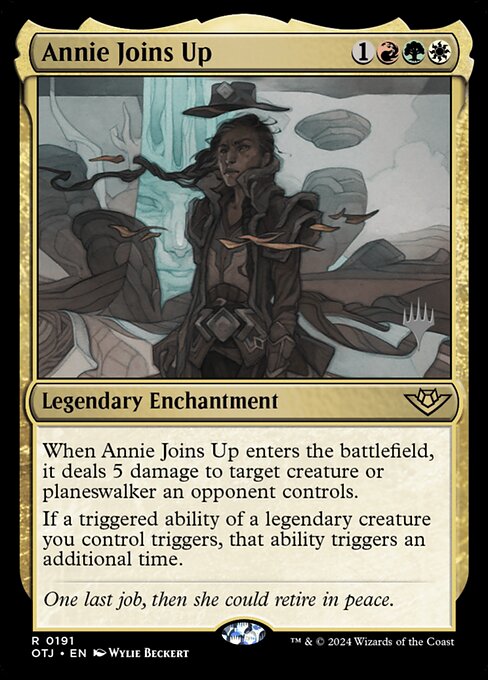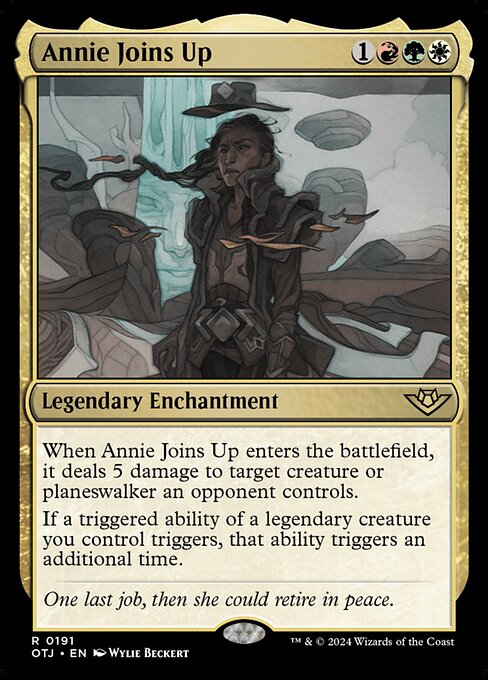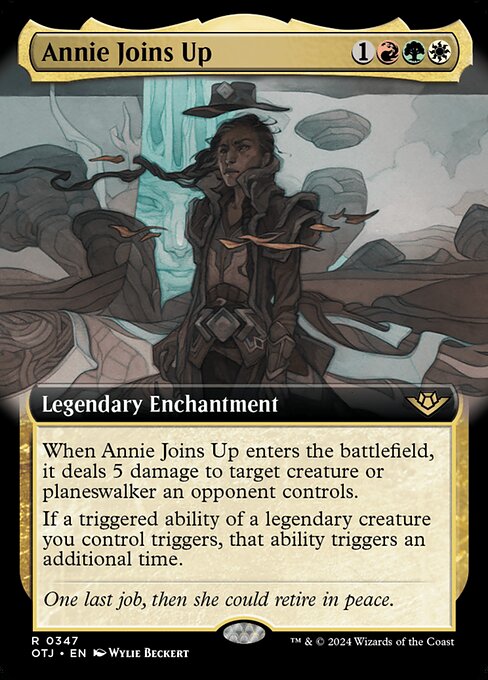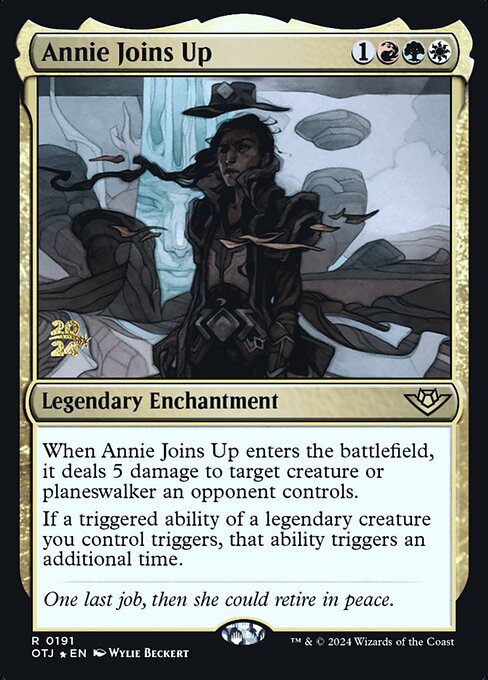standard
future
historic
gladiator
pioneer
explorer
modern
legacy
pauper
vintage
penny
commander
brawl
alchemy
paupercommander
duel
oldschool
premodern
Rulings
In some cases involving linked abilities, an ability requires information about “the exiled card.” When this happens, the ability gets multiple answers. If these answers are being used to determine the value of a variable, the sum is used. For example, if Elite Arcanist’s enters-the-battlefield ability triggers twice, two cards are exiled. The value of X in the activation cost of Elite Arcanist’s other ability is the sum of the two cards’ mana values. As the ability resolves, you create copies of both cards and can cast none, one, or both of the copies in any order.
Triggered abilities use the word “when,” “whenever,” or “at.” They’re often written as “[Trigger condition], [effect].” Some keyword abilities are triggered abilities and will have “when,” “whenever,” or “at the beginning of” in their reminder text.
Annie Joins Up’s last ability doesn’t copy the triggered ability; it just causes the ability to trigger an additional time. Any choices made as you put the ability onto the stack, such as modes and targets, are made separately for each instance of the ability. Any choices made on resolution, such as whether to put counters on a permanent, are also made individually.
Once an ability of a creature you control has triggered, making it legendary won’t cause that ability to trigger an additional time. Similarly, once an ability of a legendary creature you control has triggered an additional time due to Annie Joins Up’s last ability, turning it into a nonlegendary creature won’t remove that additional triggered ability from the stack.
If a triggered ability is linked to a second ability, additional instances of that triggered ability are also linked to that second ability. If the second ability refers to “the exiled card,” it refers to all cards exiled by instances of the triggered ability.
Replacement effects are unaffected by Annie Joins Up’s last ability. For example, a 1/1 creature that enters the battlefield under your control with one +1/+1 counter on it won’t receive an additional +1/+1 counter.
Abilities that apply “as [this creature] enters the battlefield” or “as [this creature] is turned face up” are also unaffected.
Abilities that apply “when [this creature] is turned face up” will trigger an additional time only if that creature is legendary once it has been turned face up.
Triggered abilities use the word “when,” “whenever,” or “at.” They’re often written as “[Trigger condition], [effect].” Some keyword abilities are triggered abilities and will have “when,” “whenever,” or “at the beginning of” in their reminder text.
Annie Joins Up’s last ability doesn’t copy the triggered ability; it just causes the ability to trigger an additional time. Any choices made as you put the ability onto the stack, such as modes and targets, are made separately for each instance of the ability. Any choices made on resolution, such as whether to put counters on a permanent, are also made individually.
Once an ability of a creature you control has triggered, making it legendary won’t cause that ability to trigger an additional time. Similarly, once an ability of a legendary creature you control has triggered an additional time due to Annie Joins Up’s last ability, turning it into a nonlegendary creature won’t remove that additional triggered ability from the stack.
If a triggered ability is linked to a second ability, additional instances of that triggered ability are also linked to that second ability. If the second ability refers to “the exiled card,” it refers to all cards exiled by instances of the triggered ability.
Replacement effects are unaffected by Annie Joins Up’s last ability. For example, a 1/1 creature that enters the battlefield under your control with one +1/+1 counter on it won’t receive an additional +1/+1 counter.
Abilities that apply “as [this creature] enters the battlefield” or “as [this creature] is turned face up” are also unaffected.
Abilities that apply “when [this creature] is turned face up” will trigger an additional time only if that creature is legendary once it has been turned face up.
Rulings
In some cases involving linked abilities, an ability requires information about “the exiled card.” When this happens, the ability gets multiple answers. If these answers are being used to determine the value of a variable, the sum is used. For example, if Elite Arcanist’s enters-the-battlefield ability triggers twice, two cards are exiled. The value of X in the activation cost of Elite Arcanist’s other ability is the sum of the two cards’ mana values. As the ability resolves, you create copies of both cards and can cast none, one, or both of the copies in any order.
Triggered abilities use the word “when,” “whenever,” or “at.” They’re often written as “[Trigger condition], [effect].” Some keyword abilities are triggered abilities and will have “when,” “whenever,” or “at the beginning of” in their reminder text.
Annie Joins Up’s last ability doesn’t copy the triggered ability; it just causes the ability to trigger an additional time. Any choices made as you put the ability onto the stack, such as modes and targets, are made separately for each instance of the ability. Any choices made on resolution, such as whether to put counters on a permanent, are also made individually.
Once an ability of a creature you control has triggered, making it legendary won’t cause that ability to trigger an additional time. Similarly, once an ability of a legendary creature you control has triggered an additional time due to Annie Joins Up’s last ability, turning it into a nonlegendary creature won’t remove that additional triggered ability from the stack.
If a triggered ability is linked to a second ability, additional instances of that triggered ability are also linked to that second ability. If the second ability refers to “the exiled card,” it refers to all cards exiled by instances of the triggered ability.
Replacement effects are unaffected by Annie Joins Up’s last ability. For example, a 1/1 creature that enters the battlefield under your control with one +1/+1 counter on it won’t receive an additional +1/+1 counter.
Abilities that apply “as [this creature] enters the battlefield” or “as [this creature] is turned face up” are also unaffected.
Abilities that apply “when [this creature] is turned face up” will trigger an additional time only if that creature is legendary once it has been turned face up.
Triggered abilities use the word “when,” “whenever,” or “at.” They’re often written as “[Trigger condition], [effect].” Some keyword abilities are triggered abilities and will have “when,” “whenever,” or “at the beginning of” in their reminder text.
Annie Joins Up’s last ability doesn’t copy the triggered ability; it just causes the ability to trigger an additional time. Any choices made as you put the ability onto the stack, such as modes and targets, are made separately for each instance of the ability. Any choices made on resolution, such as whether to put counters on a permanent, are also made individually.
Once an ability of a creature you control has triggered, making it legendary won’t cause that ability to trigger an additional time. Similarly, once an ability of a legendary creature you control has triggered an additional time due to Annie Joins Up’s last ability, turning it into a nonlegendary creature won’t remove that additional triggered ability from the stack.
If a triggered ability is linked to a second ability, additional instances of that triggered ability are also linked to that second ability. If the second ability refers to “the exiled card,” it refers to all cards exiled by instances of the triggered ability.
Replacement effects are unaffected by Annie Joins Up’s last ability. For example, a 1/1 creature that enters the battlefield under your control with one +1/+1 counter on it won’t receive an additional +1/+1 counter.
Abilities that apply “as [this creature] enters the battlefield” or “as [this creature] is turned face up” are also unaffected.
Abilities that apply “when [this creature] is turned face up” will trigger an additional time only if that creature is legendary once it has been turned face up.
Your collection? Your decks?
Want to manage your collection and/or create decks?



 0
0
 2.20€
2.20€

